By Alison Weir:
Excerpted and adapted from Will Ketanji Brown Jackson be able to transcend her pro-Israel influences? and Ruth Bader Ginsburg… If only she had supported equal rights for everyone and Louis Brandeis, Zionism, and the “Parushim”
Abe Fortas
The Supreme Court has handed down some significant decisions over the years related to Israel.
One of these was in 1967, when an Israeli citizen brought a case before the Supreme Court that ended up changing a longstanding American tradition.
A naturalized American named Beys Afroyim, who had then become an Israeli citizen, sought to overturn a law that prohibited dual citizenship. Afroyim, whose original name had been Ephraim Bernstein, was a member of the communist party who had fled the U.S., lived in Cuba for awhile, and then moved to Israel.
While a previous lawsuit on behalf of a Mexican individual had failed, the Israeli lawsuit had a different fate. Although both the Washington DC District Court and the Court of Appeals had affirmed the U.S. law, the Supreme Court overturned their decisions and found in favor of the Israeli.
The swing vote was cast by Supreme Court Justice Abe Fortas, an Israel loyalist. The Jewish Press reports that Fortas “was an unabashed Israel supporter who influenced LBJ’s strong pro-Israel position during the 1967 Arab-Israeli War; as author/historian Laura Kalman aptly put it, he was ‘a Jew who cared more about Israel than Judaism.’”
Author Donald Neff writes: “Among his first thoughts when he was unseated from the court had been to visit Israel. There was nothing wrong with that, obviously, but it did indicate an attachment of such personal importance that he should have recused himself from the dual citizenship case.”
Neff concludes: “His action, along with four others on the court, had destroyed a 200-year tradition.” This occurred without the concurrence of the American people.
Fortas was eventually forced to resign over allegations that he had accepted a bribe from his friend corporate raider Louis Wolfson to protect Wolfson from going to prison for stock manipulation. Wolfson was reportedly “a staunch benefactor of Jewish causes and of the state of Israel.” Wolfson also allegedly bribed radio host Larry King during the episode.
(Fortas was also charged with being soft on pornography. Newsweek reports that the porn charge was “based in fact. Fortas was involved in several rulings that effectively legalized pornography.”)
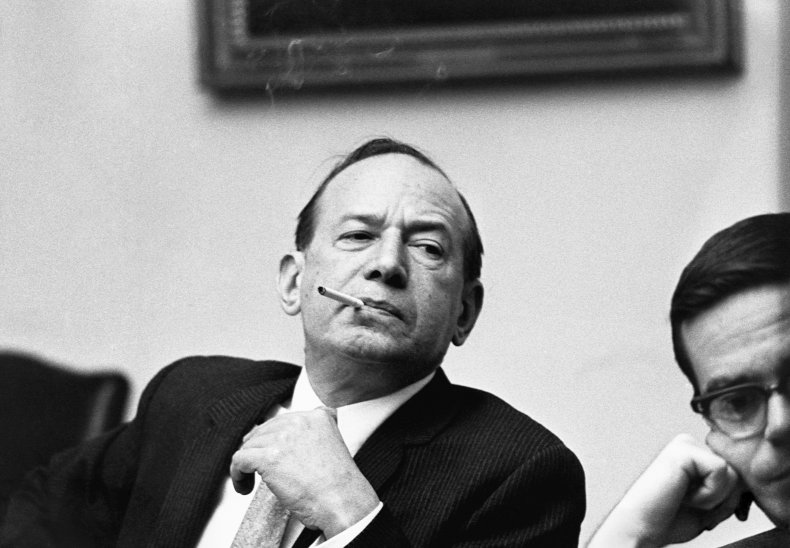
AIPAC calls Supreme Court decision authored by Breyer a “victory”
Another court case regarding Israel was in 1998 and concerned the notorious pro-Israel lobby organization AIPAC (American Israel Public Affairs Committee). AIPAC has long been considered the most powerful organization for a foreign country in the U.S.
In 1996 a federal court had found that AIPAC and 27 pro-Israel political action committees were guilty of violating federal election laws.
The individuals who had initiated the case were ebullient, believing that the ruling could help loosen the “stranglehold” that Israel’s lobby had on U.S. Middle East policy. Largely because of AIPAC and the other members of the Israel lobby, the U.S. gives Israel over $10 million per day (and expends an additional $10 million per day on behalf of Israel).
The plaintiffs’ excitement at the court’s ruling was short lived, however. Eventually, the Supreme Court heard the case and rendered a decision that AIPAC declared a “victory.” The Jewish Telegraphic Agency reported that the Court’s ruling “made it highly unlikely that the pro-Israel lobby would have to disclose information about its membership and expenditures.”
An attorney for AIPAC said the Supreme Court “did exactly what we asked.”

The decision was authored by Justice Stephen Breyer. One of the plaintiffs in the suit, former Illinois Congressman Paul Findley, wrote: “Breyer’s decision is one of those extremely rare cases in which the high court deliberately and blatantly finessed a showdown with one of the nation’s most powerful lobbies.”
Breyer, a distinguished, widely respected Justice who has mentored Jackson, may have committed an indiscretion. Despite an attachment to Israel that suggests recusal would have been appropriate, Breyer chose to remain on the case.
Breyer serves on the International Advisory Council of an Israeli organization called the Israel Democracy Institute (IDI). IDI is committed to Israel as a “Jewish state” and is “dedicated to strengthening the foundations of Israeli democracy.” It has received Israel’s most prestigious award, the Israel Prize for Lifetime Achievement.
Some of Breyer’s fellow Council members are neocon Elliott Abrams, New York Times columnist Bret Stephens, author Anne Applebaum, and former ambassador to Israel Martin Indyk.

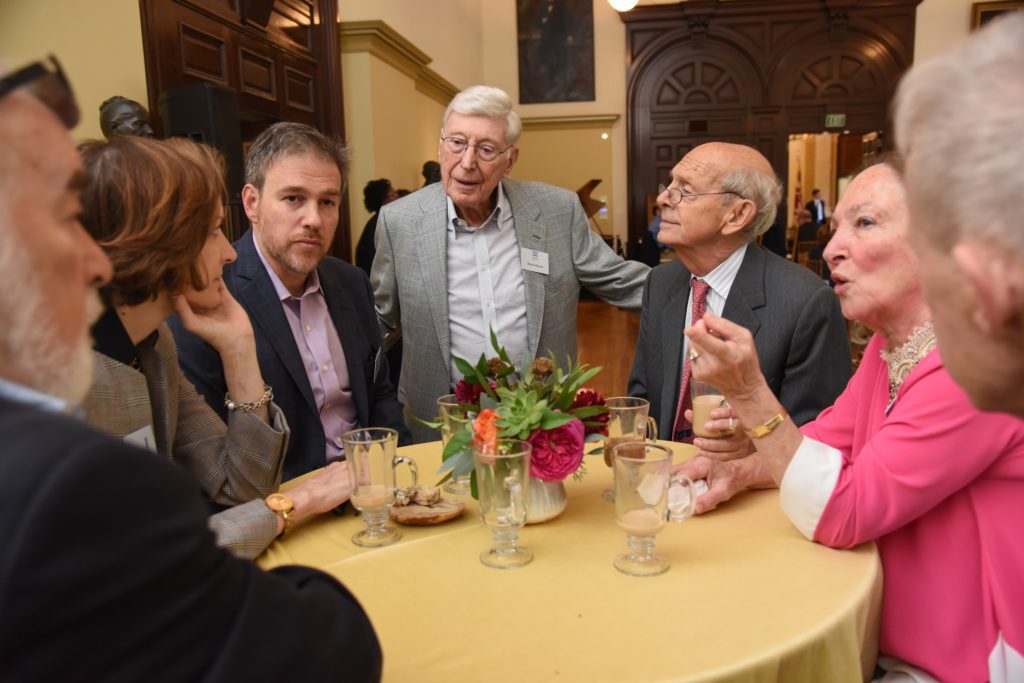
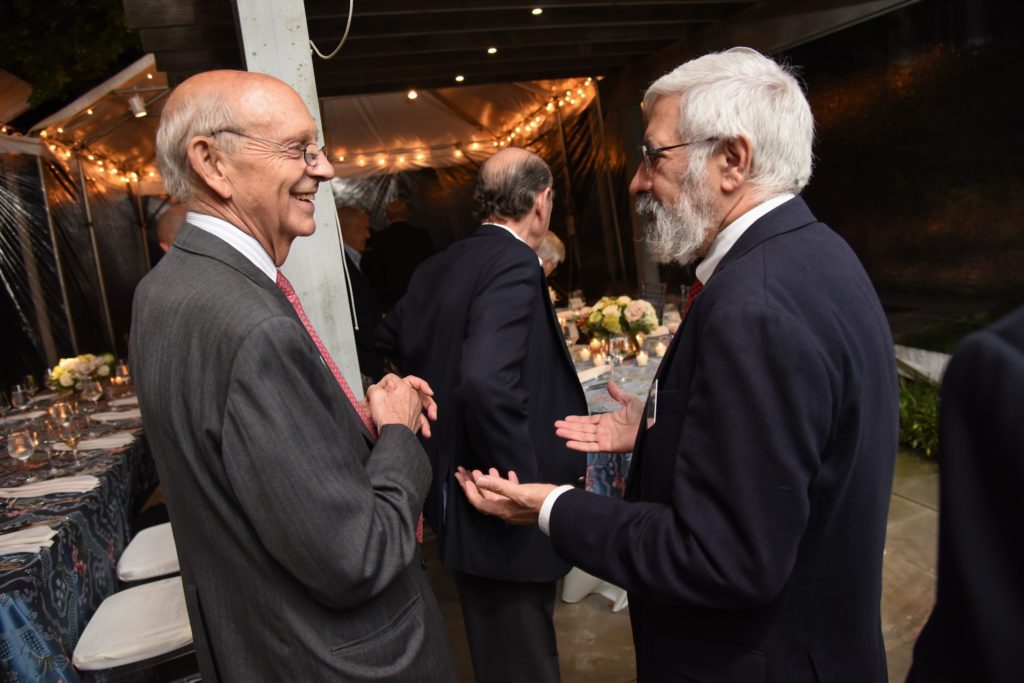
Breyer endorses Israeli courts, despite their manifold abuses
In addition to his service with IDI, Breyer has said that the U.S. should learn from Israeli courts.
This is a surprising viewpoint from a Justice known as a progressive. In point of fact, Israeli courts have long been known for their rampant abuses against Palestinians.
At the time that Breyer made this statement, the Israeli supreme court had just upheld the practice of detaining Palestinians without trial, sometimes for many years. It had also approved demolition of the family homes of Palestinian prisoners (this is collective punishment and illegal under the Geneva Conventions).

Israeli trials of Palestinians are often seen as kangaroo courts. At the time that Breyer praised Israel’s judicial system, the conviction rate of Palestinians in Israeli military courts was 97 percent (this has since grown to 99.74 percent).
A year before Breyer’s statement, Foreign Service Journal had published a detailed report on Israeli torture of Palestinian Americans, noting that Palestinian prisoners “are routinely denied family visits for long periods and deprived of access to legal counsel. Their interrogations routinely include torture.” Palestinians are often found “guilty” based on “confessions” in Hebrew, even when they don’t speak Hebrew.
Louis Brandeis & Felix Frankfurter
Breyer’s seat on the court was known as the “Jewish seat” (although two other Justices serving concurrently with him were also Jewish). The first holder of the seat had been Louis Brandeis, who had led World Zionism from his Supreme Court chambers.
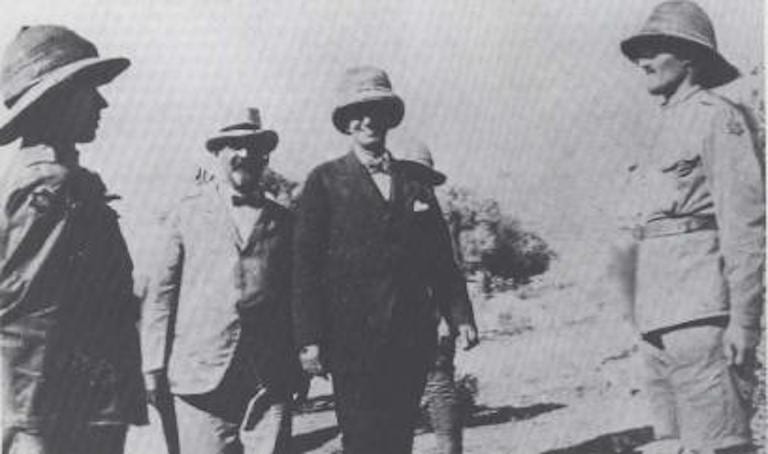
In 1912 prominent Jewish American attorney Louis Brandeis, who was to go on to become a Supreme Court Justice, became a Zionist. Within two years he became head of the international Zionist Central Office, newly moved to America from Germany. (Citations for the following are here.)
While Brandeis is an unusually well known Supreme Court Justice, most Americans are unaware of the significant role he played in World War I and of his connection to Palestine.
Some of this work was done with Felix Frankfurter, who became a Supreme Court Justice two decades later.
Perhaps the aspect of Brandeis that is least known to the general public – and often even to academics – is the extent of his zealotry and the degree to which he used covert methods to achieve his aims.
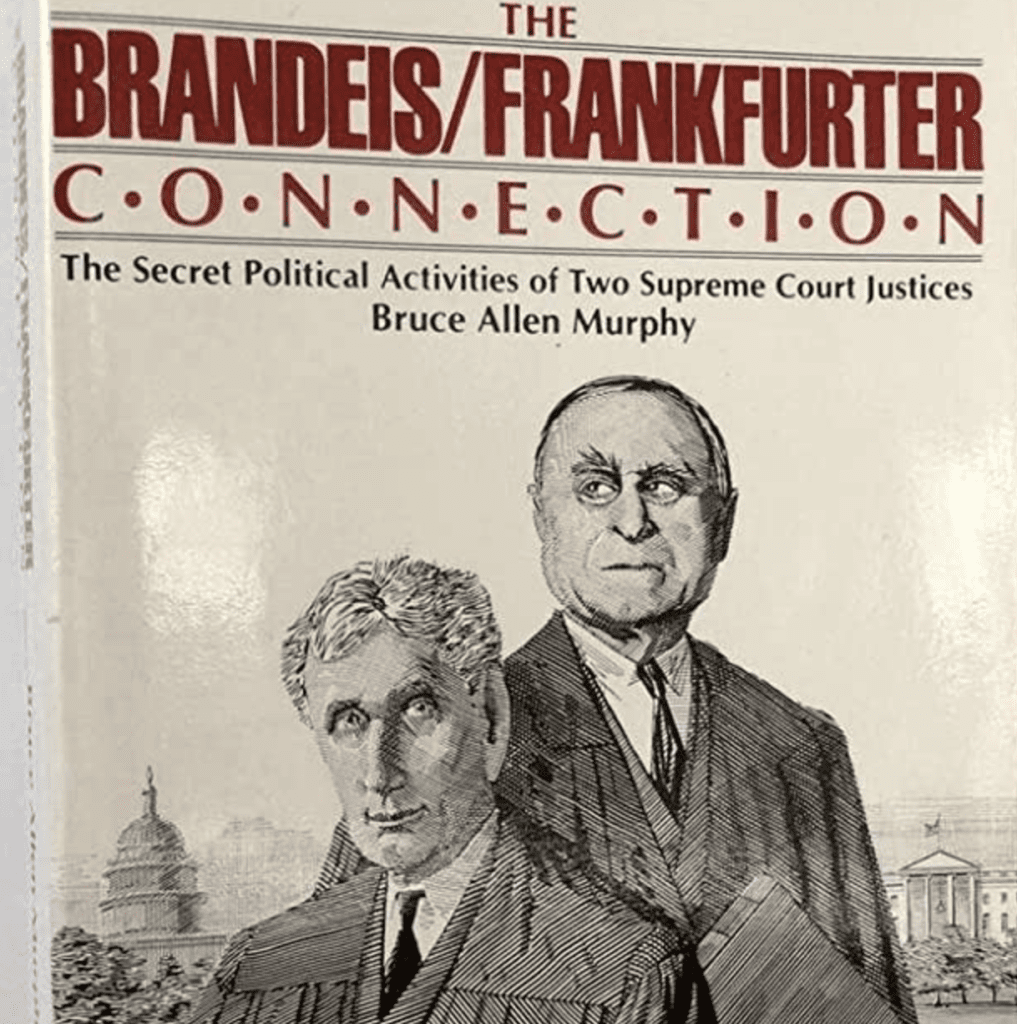
While today Brandeis is held in extremely high esteem by almost all of us, there was significant opposition at the time to his appointment to the Supreme Court, largely centered on widespread accusations of unethical behavior. A typical example was the view that Brandeis was “a man who has certain high ideals in his imagination, but who is utterly unscrupulous, in method in reaching them.”
While today such criticisms of Brandeis are either ignored or attributed to political differences and/or “anti-Semitism,” there is evidence suggesting that such views may have been more accurate than Brandeis partisans would like.
In 1982 historian Bruce Allen Murphy, in a book that won a Certificate of Merit from the American Bar Association, reported that Brandeis and Frankfurter had secretly collaborated over many years on numerous covert political activities. Zionism was one of them.
“[I]n one of the most unique arrangements in the Court’s history, Brandeis enlisted Frankfurter, then a professor at Harvard Law School, as his paid political lobbyist and lieutenant,” writes Murphy, in his book The Brandeis/Frankfurter Connection: The Secret Political Activities of Two Supreme Court Justices. “Working together over a period of 25 years, they placed a network of disciples in positions of influence, and labored diligently for the enactment of their desired programs.”
“This adroit use of the politically skillful Frankfurter as an intermediary enabled Brandeis to keep his considerable political endeavors hidden from the public,” continues Murphy.
Brandeis only mentioned the arrangement to one other person, Murphy writes, “another Zionist lieutenant– Court of Appeals Judge Julian Mack.”
One reason that Brandeis and Frankfurter kept the arrangement secret was that such behavior by a sitting Supreme Court justice is considered highly unethical. As an editorial in the New York Times pointed out following the publication of Murphy’s book, “… the Brandeis-Frankfurter arrangement was wrong. It serves neither history nor ethics to judge it more kindly, as some seem disposed to do… the prolonged, meddlesome Brandeis-Frankfurter arrangement violates ethical standards.”
The Times reiterates a point also made by Murphy: the fact that Brandeis and Frankfurter kept their arrangement secret demonstrated that they knew it was unethical – or at least realized that the public would view it as such: “They were dodging the public’s appropriate measure of fitness.”
Later, when Frankfurter himself became a Supreme Court Justice, he used similar methods, “placing his own network of disciples in various agencies and working through this network for the realization of his own goals.” These included both Zionist objectives and “Frankfurter’s stewardship of FDR’s programs to bring the U.S. into battle against Hitler.”
Their activities, Murphy notes, were “part of a vast, carefully planned and orchestrated political crusade undertaken first by Brandeis through Frankfurter and then by Frankfurter on his own to accomplish extrajudicial political goals.”
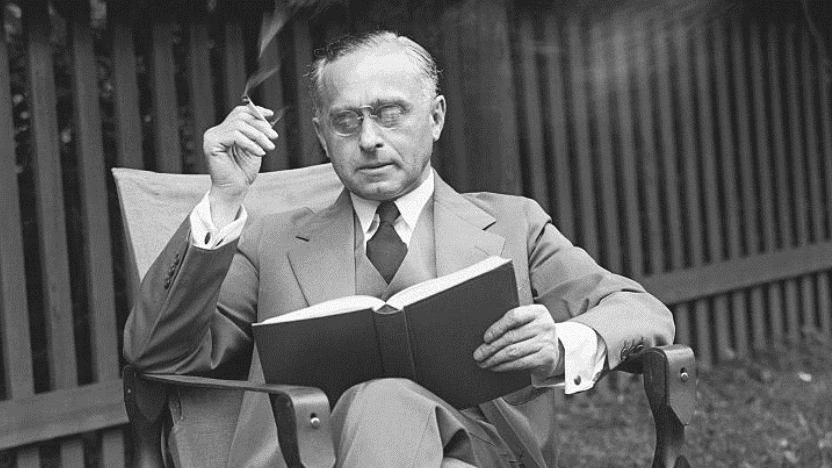
Frankfurter had joined the Harvard faculty in 1914 at the age of 31, a post gained after a Brandeis-initiated donation from financier Jacob Schiff to Harvard created a position for Frankfurter[38]. Then, Murphy writes, “for the next 25 years, [Frankfurter] shaped the minds of generations of the nation’s most elite law students.”
After Brandeis became head of the American Zionist movement, he “created an advisory council–an inner circle of his closest advisers–and appointed Felix Frankfurter as one of its members.”
The Parushim
Even more surprising to this author – and even less well-known both to the public and to academics – is Brandeis’s membership in a secret society that covertly pushed Zionism both in the U.S. and internationally.
Israeli professor Dr. Sarah Schmidt first reported this information in an article about the society published in 1978 in the American Jewish Historical Quarterly. She also devoted a chapter to the society in a 1995 book. Harvard author and former New York Times editor Peter Gross, sympathetic to Zionism[42], also reported on it in both a book and several subsequent articles.
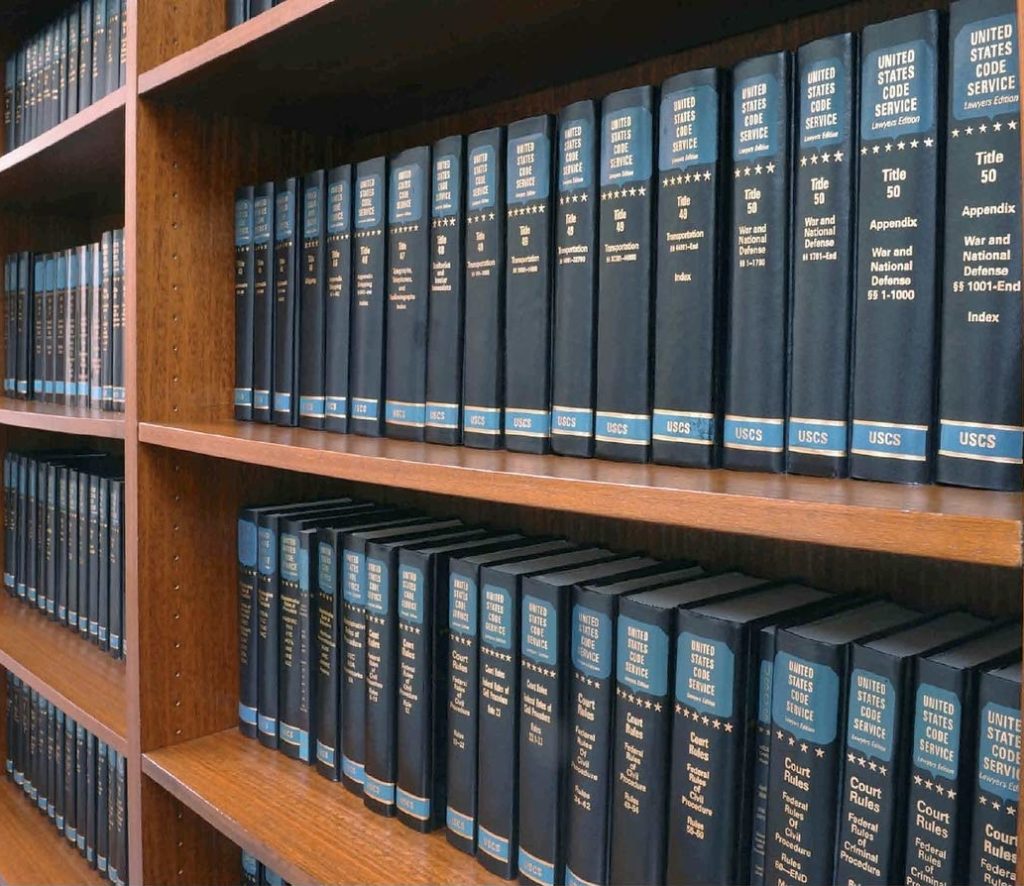
According to Grose, a highly regarded author, Brandeis was a leader of “an elitist secret society called the Parushim, the Hebrew word for ‘Pharisees’ and ‘separate,’ which grew out of Harvard’s Menorah Society.”
Schmidt writes: “The image that emerges of the Parushim is that of a secret underground guerilla force determined to influence the course of events in a quiet, anonymous way.”
Grose writes that Brandeis used the Parushim “as a private intellectual cadre, a pool of manpower for various assignments.”[45] Brandeis recruited ambitious young men, often from Harvard, to work on the Zionist cause – and further their careers in the process.
“As the Harvard men spread out across the land in their professional pursuits,” Grose reports, “their interests in Zionism were kept alive by secretive exchanges and the trappings of a fraternal order. Each invited initiate underwent a solemn ceremony, swearing the oath ‘to guard and to obey and to keep secret the laws and the labor of the fellowship, its existence and its aims.'”
At the secret initiation ceremony, new members were told:
“You are about to take a step which will bind you to a single cause for all your life. You will for one year be subject to an absolute duty whose call you will be impelled to heed at any time, in any place, and at any cost. And ever after, until our purpose shall be accomplished, you will be fellow of a brotherhood whose bond you will regard as greater than any other in your life–dearer than that of family, of school, of nation.”
While Brandeis was a key leader of the Parushim, an academic named Horace M. Kallen was its founder, creating it in 1913. Kallen was an academic first hired by Woodrow Wilson, who was then president of Princeton, to teach English there.[48] When Kallen founded the Parushim he was a philosophy professor at the University of Wisconsin in Madison. Kallen is generally considered the father of cultural pluralism.
In her book on Kallen, Schmidt includes more information on the society in a chapter entitled, “Kallen’s Secret Army: The Parushim.”
She reports, “A member swearing allegiance to the Parushim felt something of the spirit of commitment to a secret military fellowship.”
“Kallen invited no one to become a member until the candidate had given specific assurances regarding devotion and resolution to the Zionist cause,” Schmidt writes, “and each initiate had to undergo a rigorous analysis of his qualifications, loyalty, and willingness to take orders from the Order’s Executive Council.”[50] Not surprisingly, it appears that Frankfurter was a member.
‘We must work silently, through education and infection’
Members of the Parushim were quite clear about the necessity of keeping their activities secret. An early recruiter to the Parushim explained: “An organization which has the aims we have must be anonymous, must work silently,[52] and through education and infection rather than through force and noise.” He wrote that to work openly would be “suicidal” for their objective.
Grose describes how the group worked toward achieving its goals: “The members set about meeting people of influence here and there, casually, on a friendly basis. They planted suggestions for action to further the Zionist cause long before official government planners had come up with anything.”
“For example,” Grose writes, “as early as November 1915, a leader of the Parushim went around suggesting that the British might gain some benefit from a formal declaration in support of a Jewish national homeland in Palestine.”
Brandeis was a close personal friend of President Woodrow Wilson and used this position to advocate for the Zionist cause, at times serving as a conduit between British Zionists and the president.
In 1916 President Wilson named Brandeis to the Supreme Court. At that time, as was required by standard ethics, Brandeis gave in to pressure to officially resign from all his private clubs and affiliations, including his leadership of Zionism. But behind the scenes he continued this Zionist work, quietly receiving daily reports in his Supreme Court chambers and issuing orders to his loyal lieutenants.
When the Zionist Organization of America (ZOA) was reorganized in 1918, Brandeis was listed as its “honorary president.” However, he was more than just “honorary.”
As historian Donald Neff writes, “Through his lieutenants, he remained the power behind the throne.” One of these lieutenants, of course, was Frankfurter.
Zionist membership expanded dramatically during World War I, despite the efforts of some Jewish anti-Zionists, one of whom called the movement a “foreign, un-American, racist, and separatist phenomenon.”
Ruth Bader Ginsburg
Another Justice who voted with Breyer on the 1998 AIPAC case was also an open Israel partisan. Ruth Bader Ginsburg was a life long member of the Women’s Zionist Organization of America, received a lifetime award from Israel, and was an “enthusiastic” Zionist. Yet, she also did not recuse herself from the AIPAC case.
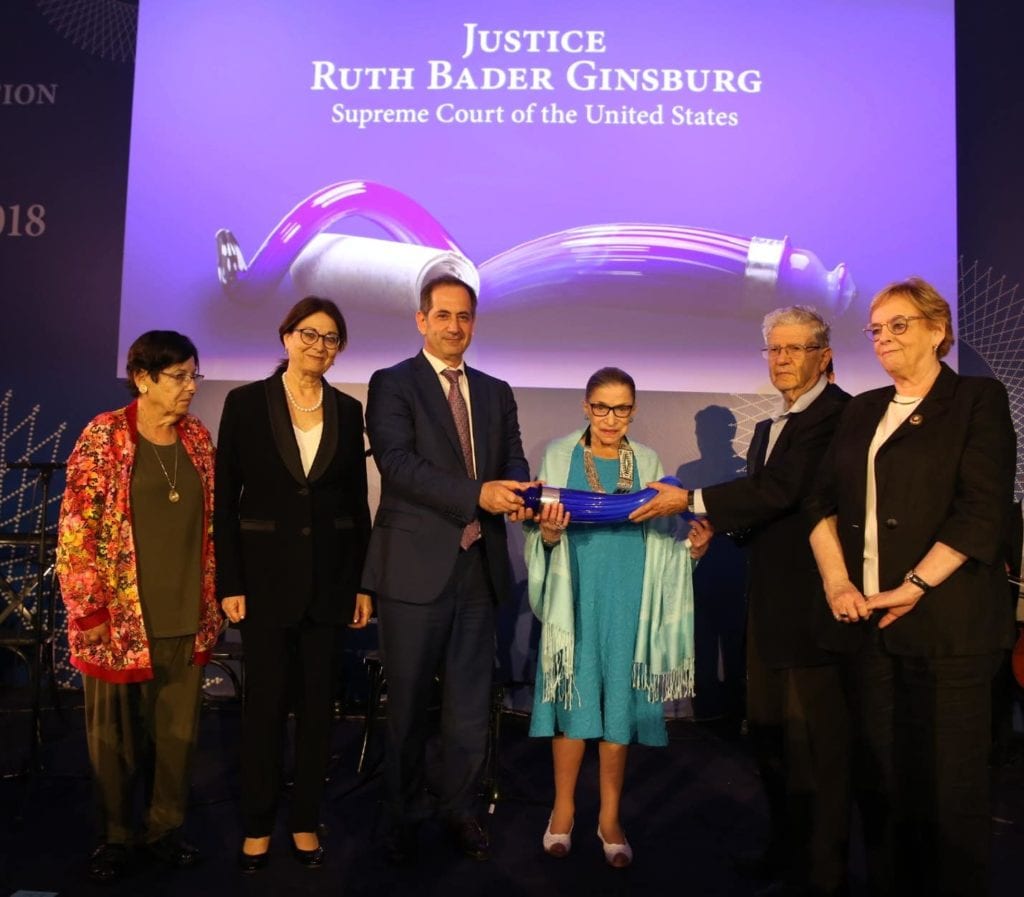
Ginsburg was extremely popular in Israel, and the love was returned. Former Israeli Supreme Court President Dorit Beinisch writes that Ginsburg was “a true friend of Israel.”
Ginsburg was a lifetime member of Hadassah, the Women’s Zionist Organization of America, which is committed to Israel. (The Jewish Forward reports that Ginsburg was an “enthusiastic” Zionist, but notes this is rarely mentioned by her fanbase.)
Ginsburg’s commitment to Israel was exemplified in 2018, when she traveled to Israel for the fifth time. The purpose of her trip was to accept, in the words of Ha’aretz, an award from an organization “snubbed earlier this year by actor Natalie Portman.”
The action by Portman, an Israeli-American star, had caused major controversy in Israel. She had turned down what has sometimes been called “Israel’s Nobel Prize.”
Portman said that recent events in Israel had been “extremely distressing,” and she did “not feel comfortable participating in any public events in Israel.” Portman said she could “not in good conscience move forward with the ceremony.”
Portman explained on Instagram that Israeli Prime Minister Netanyahu and Israel’s “mistreatment of those suffering from today’s atrocities” had caused her to refuse the extremely prestigious prize – and one accompanied by two million dollars.
A follow up article in Ha’aretz about the controversy showed that on the day of Portman’s Instagram post about “today’s atrocities,” a UN envoy had blasted Israel for shooting children. Israeli forces had just shot dead four Palestinians, including a 15 year old boy, and wounded 156 others. (Over the past 20 years Israeli forces have killed over 2,000 Palestinian children, while Palestinian resistance groups have killed 134 Israeli children.)
The most recent deaths had taken place during during Gaza’s massive “Great March of Return,” an unarmed uprising in Gaza against Israel’s suffocating blockade and confiscation of Palestinian land. Thousands of Gazan men, women, and children had been protesting weekly since the end of March, and Israeli forces were shooting demonstrators every week.
Portman’s rejection of the prize, and Israel’s killing of unarmed demonstrators, didn’t stop Ginsburg from accepting the award. In fact, the outspoken Ginsburg doesn’t seem to have even commented about the Portman controversy, or Israel’s daily atrocities in Gaza.
Ginsburg ignores Israeli forces shooting women the day before
Ginsburg’s silence is particularly noteworthy given her long history of advocacy for women, and an event that occurred the day before the awards ceremony: Thousands of Palestinian women and girls in Gaza had marched in a women’s march against Israeli oppression, while a group of Israeli women marched in Israel in solidarity with them.
According to reports, the Gaza marchers included “mothers, wives, daughters and sisters of those killed and injured during the Great March of Return protests, as well as female journalists and university students.”

As usually happens in such protests, Israeli forces were immediately deployed against the nonviolent demonstrators, and soldiers used live ammunition, shooting three and injuring 130.

The next day – the day that Ginsburg was to receive the award – Ha’aretz featured an article headlined: “Israeli Women Rally From Across the Border in Solidarity With Gaza Women’s March.” The article reported: “A group of about 50 activists gathered and marched in solidarity on Israel’s side of the Gaza border Tuesday evening during the first planned women’s march of the ongoing Gaza protests.” The article featured several photos, including one of a protestor wounded by Israeli forces:

Apparently untroubled by this violence against Palestinian women, that evening Ginsburg accepted her award in an elegant ceremony in Tel Aviv. According to AP, her acceptance speech “cited Holocaust diarist Anne Frank” and “touched on [Ginsburg’s] fight for women’s rights.” AP noted that she “often cites her Jewish heritage” as a source for her “sensitivity to the plight of oppressed minorities.”
The award honored Ginsburg “for her enormous legal contribution to advancing the protection of women’s rights, the right to equality and the rights of all human beings.” The Israeli audience gave her a “rapturous reception.”
Celebrity, cultural icon, leader of the Supreme Court’s liberal wing
One of the recent Ha’aretz articles about Ginsburg states that she was “the first Jewish candidate to sit on the court since the resignation of Justice Abe Fortas in 1969.” (Fortas, who resigned amid accusations of corruption, had helped pave the way for dual citizenship with Israel in 1967.)*
Over the years, Ginsburg has become a major celebrity. As Ha’aretz reports:
During her 27 years on the court, Ginsburg gained millions of fans and admirers around the world, and eventually became a cultural icon in the United States, the subject of movies, museum exhibitions, and books for adults and children alike. A 2019 film about her early professional life, “On the Basis of Sex,” was a modest box office hit, with actress Felicity Jones portraying the jurist. But it was the 2018 documentary about Ginsburg, “RBG,” that created a real artistic buzz, including an Academy Award nomination for best documentary.
At the same time, Ginsburg grew to be a major influence on the Supreme Court. Ha’aretz notes: “Ginsburg established herself as the de facto leader of the Supreme Court’s liberal wing. Together with justices Stephen Breyer, Elena Kagan and Sonia Sotomayor…”
One of the cases the court considered during this time concerned the notorious pro-Israel lobby organization AIPAC (American Israel Public Affairs Committee). AIPAC has long been considered the most powerful organization for a foreign country in the US.
In 1997 a federal court found that AIPAC and 27 pro-Israel political action committees were guilty of violating federal election laws. As mentioned above, the individuals who had initiated the case were ecstatic, believing that the ruling could help loosen the “stranglehold” that Israel’s lobby had on U.S. Middle East policy. Largely because of AIPAC and the other members of the Israel lobby, the US gives Israel over $ 10 million per day (and expends an additional $10 million per day on behalf of Israel).
Their excitement was short lived, however. The next year the case went to the Supreme Court, which, with Ginsburg’s help, overturned the ruling, 6-3. Antonin Scalia wrote the dissenting opinion.
Despite her membership in a group that works for Israel, Ginsburg did not recuse herself from the case.
Separation of church and state – except for Israel
The Forward states: “Among the principles that were dear to Ginsburg’s heart as she presided in the Supreme Court for nearly three decades was a dedication to the separation of church and state.”
The article states: “The first Jewish woman on the Supreme Court, Ginsburg dedicated herself to assuring that Christianity was not privileged by the government above other religions.”
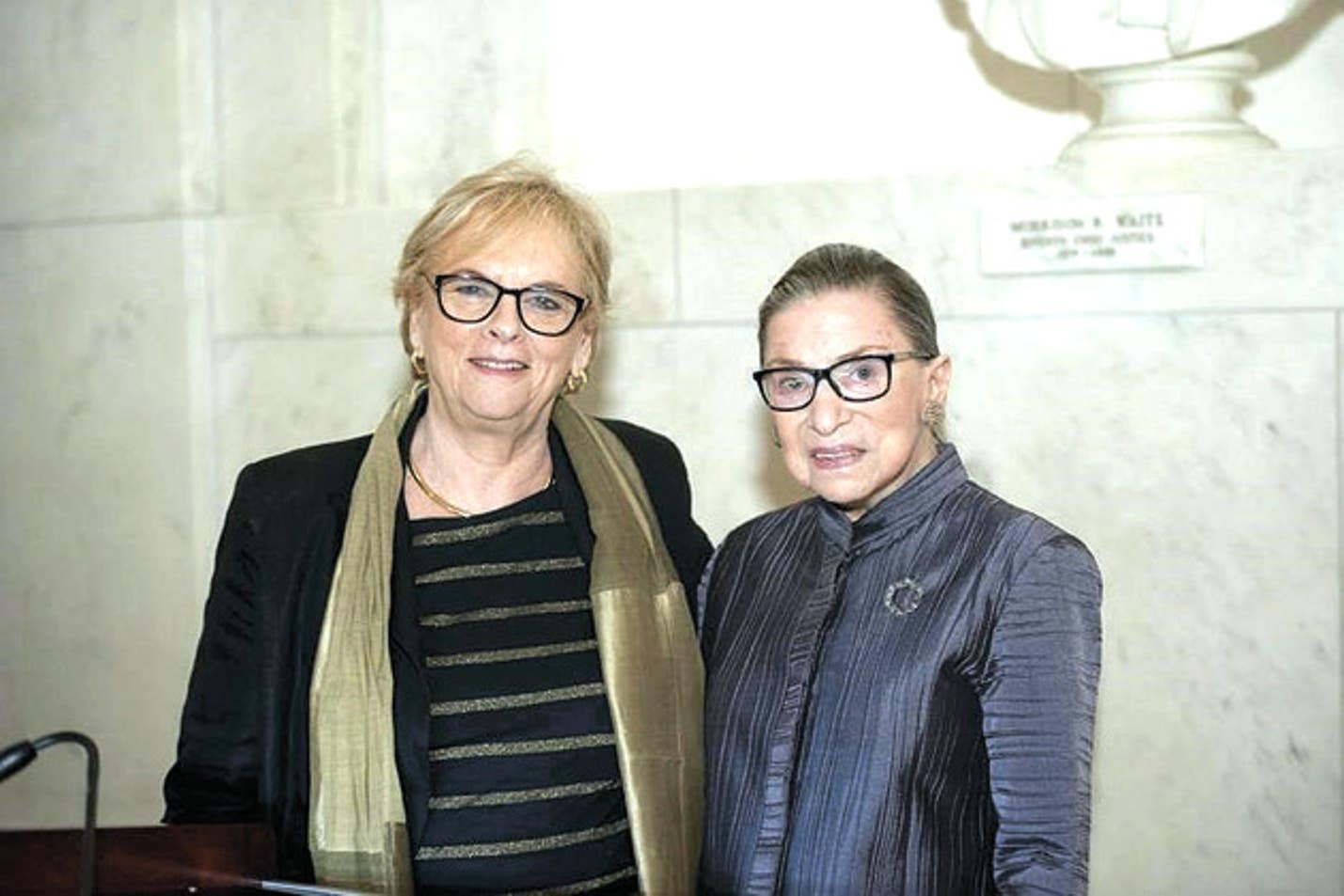
Yet, the Israeli system is based on a close connection between religion and the state, and there is systemic discrimination against Christians, Muslims, and non-Jews in general. As a prominent Israeli author wrote, there is “no separation of synagogue and state” in Israel.
A few weeks before Ginsburg decided to accept the Genesis award, Israel blocked hundreds of Palestinian Christians from praying at the Church of the Holy Sepulchre. The month before, Christian leaders protested what they said was Israel’s flagrant attempt to “weaken the Christian presence in Jerusalem.” Such stories go on and on and on.

Former Israeli Supreme Court president Beinisch writes that Ginsburg has had historic influence:
“We often wonder how legal rulings can change social norms. These are long-term processes, and we do not always get to see the results. But Ginsburg was able to do so during her lifetime – to look back and to see her extensive influence…”
Beinisch notes: “I cannot think of another legal figure who had such a profound influence on and awareness of the daily lives of the society in which they lived as she did, or who was as popular as she was.”
If Ginsburg had joined the many Israelis, Jewish Americans, and others of all religions, races, and ethnicities who have begun to speak out against Israel’s long documented human rights abuses, and in affirmation of Palestinian rights, there seems little doubt that she could have had a significant impact. Yet, she remained silent.
But it’s not too late for others. When people proclaim that no one is free until everyone is free, they can truly mean everyone, including Palestinians.
ADDENDUM:
While Supreme Court Justice Clarence Thomas is being castigated for taking trips paid for by a wealthy friend, Both Breyer and Ginsburg also took such trips.
Open Secrets reported in 2018 that Breyer had taken 219 reimbursed trips since 2004, more than any other sitting justice. Some of those paying for his trips were the Chicago-based Pritzker family and billionaire David Rubinstein. Both benefactors are Israel partisans.
Open Secrets also reported: “Justice Ruth Bader Ginsburg disclosed taking more trips than any other justice in 2018, totaling 14. She visited Tel Aviv, Israel where she was awarded a lifetime achievement award by the Genesis Prize Foundation. Shortly following the award ceremony, she disclosed being provided transportation, food and lodging as a tourist and guest of billionaire Israeli businessman Morris Kahn.
“Kahn has had business before the Supreme Court before. The high court handed Kahn’s company Amdocs Limited a win in November 2017 when it declined to take up a patent-related case.”
Alison Weir is executive director of If Americans Knew, president of the Council for the National Interest, and author of Against Our Better Judgment: The Hidden History of How the U.S. Was Used to Create Israel. One of her talks can be viewed here.

No comments:
Post a Comment